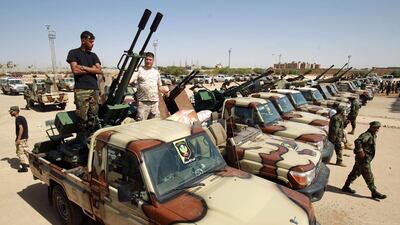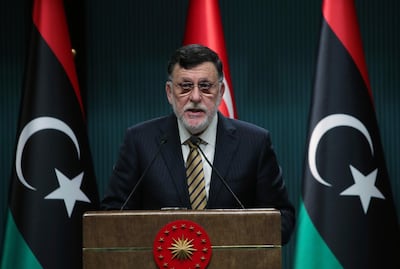A surprise ceasefire announcement by Libya's rival administrations offers a glimmer of hope for peace, but analysts caution scepticism after years of violence.
Fayez Al Sarraj, head of the Government of National Accord (GNA) based in Tripoli in the west, and Aguila Saleh, speaker of the eastern-based House of Representatives parliament, each announced a ceasefire on Friday.
In separate statements, the leaders said they wanted to end fighting and hold elections, drawing praise from the UN, the EU and Arab countries.
Emhemed Shoaeb, a key member of talks that led to the last major agreement in 2015, said the announcement was a step in the right direction that showed a "desire to break with the madness" of the past.
European Union diplomatic chief Josep Borrell described it as a constructive first step forward. Egypt, Jordan and the GCC also praised the move.
"The declaration of a ceasefire and the cessation of military operations in all Libyan territories is a very positive development," Dr Anwar Gargash, the UAE's Minister of State for Foreign Affairs, tweeted. "It is time for the guns to remain silent, as the solution in brotherly Libya is political and through an inclusive dialogue framed by agreed international and regional references."
The French foreign ministry said the ceasefire announcements "must be realised on the ground" and called for an end to all foreign interference in Libya.
The US mission to Libya retweeted the UN's tweet welcoming the news, saying it was an important step to all Libyans.
But international pressure has sought to bring Libya's leaders to an agreement several times in past years, and a lasting deal has yet to be reached.
"This is but one step in what will be an arduous process, especially since local parties distrust not only one another, but also international parties involved," Emad Badi, a senior fellow at the Washington-based Atlantic Council think tank, told the Associated Press.
Since the 2011 toppling and killing of long-time dictator Muammar Qaddafi in an uprising that sparked Nato intervention, Libya has been torn by violence, with its rival administrations vying for control and international forces backing opposing sides.
The North African country, which has the continent's largest proven crude oil reserves, has become a battleground for tribal militias, extremists and mercenaries.
It is also a major gateway for migrants bound for Europe.
"I have always said that Libyans will get serious about a truce when they all hit a wall... this may be it," Karima Munir, a banker from Tripoli, told AP.
"Both [sides] know that there is no winning party if the conflict continues."
The head of eastern-based Libyan National Army, Field Marshal Khalifa Haftar, launched an offensive to seize Tripoli from the GNA in April 2019.
But the offensive was reduced to a stalemate amid a huge increase in Turkish support for the pro-GNA militias with significant weapons transfers, soldiers and trainers on the ground as well as the deployment of thousands of Syrian mercenaries, including extremist elements.
Fighting has stalled around the central Mediterranean port of Sirte, the gateway to Libya's eastern oil fields and export terminals, and to the key Al Jufra airbase to the south.
A decisive push into the town by the pro-GNA militias and Turkish forces would spark the intervention of Egypt, President Abdel Fattah El Sisi said, citing national security if extremist militias operate near to Egypt's frontier after numerous cross-border terrorist attacks in recent years.
The warning appeared to have slowed the pro-GNA force's counter-attack against the LNA and fighting around Sirte has abated in recent days.
Despite the call for a halt in fighting, critical differences remain.
For Mr Al Sarraj, Sirte and Al Jufra – currently under the control of pro-Haftar forces – must be demilitarised.
Mr Saleh, on the other side, made no mention of demilitarised zones, but instead proposed the formation of a new presidential council – replacing Mr Al Sarraj's administration in Tripoli – to be based in Sirte.
The discrepancies are revealing, Wolfram Lacher, a researcher at the German Institute for International and Security Affairs, told AP.
"The special interests of these actors could easily derail the talks at any stage," Mr Lacher said.
Demilitarisation was "an American, British and German plan aimed at stemming Turkish and Russian influence on the ground", he said, adding that it would probably face some international opposition.
Russia has long denied or played down having an on-the-ground deployment in Libya, saying in June that a UN report alleging that 1,200 private military contractors from the Wagner Group were in the country was based on poor information and questionable sourcing.



